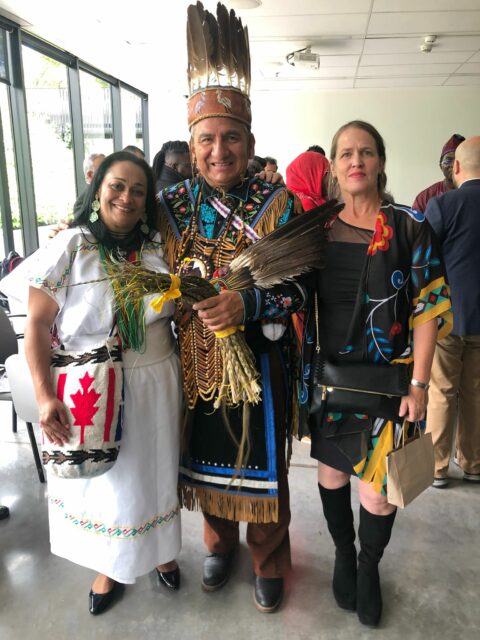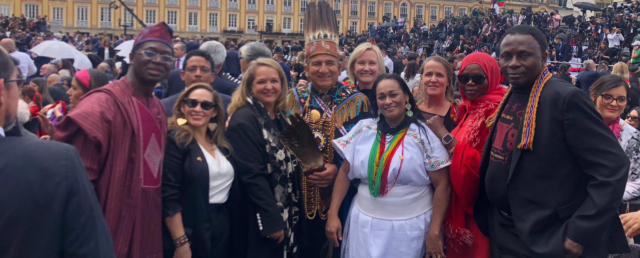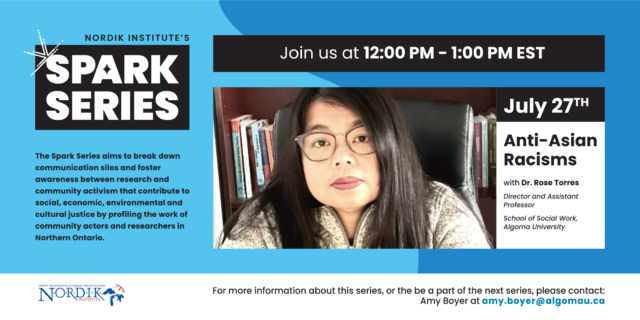Lorem ipsum dolor sit amet, consectetur adipiscing elit. Ut elit tellus, luctus nec ullamcorper mattis, pulvinar dapibus leo.
NORDIK Institute invites you to check out the Shingwauk Site Search Newsletter. In this first issue meet the Site Search team, find highlights from the 2022 Children of Shingwauk Alumni Association Gathering, and upcoming event announcements. It also includes the agenda of events for the National Day for Truth and Reconciliation: Orange Shirt Day on September 30th on the Algoma University – Sault Ste. Marie campus. Click Site Search Team News to read.
On September 30, 2022, NORDIK Institute will honour Residential school survivors, their families and communities by recognizing the National Day for Truth and Reconciliation: Orange Shirt Day. NORDIK Institute offices will be closed for the day to allow for our staff to take part in the events being held by Algoma University, virtually and on- campus.
The Sault Ste.Marie campus of Algoma University is hosting a full day of events. Beginning with a sunrise ceremony, flag raising, drop-in sharing circles with elder-in-residence Barbara Nolan, and in-person and virtual tours of the Shingwauk site. Some highlights include, the keynote speaker George Diamond, Project of Hearts community art activity, and a panel discussion on the Healing of Intergenerational Trauma. Concluding with the virtual Ontario Heritage Plaque unveiling, and drumming and round dance on the front lawn of the university. Find the full agenda here.
Shingwauk Kinoomaage Gamig’s Grand Opening is also happening on September 30th, beginning with a sunrise ceremony at 7:30 a.m. and official welcome at 9 a.m., and activities concluding by 4:30 p.m.. Find more information about this event here.
In a follow-up to the June visit of Indigenous and Afro-Colombian leaders to Ottawa and Northern Ontario, including a visit to Algoma University and Shingwauk Kinomaage Gamig, a delegation of Indigenous and Afro-Canadian leaders as well as allied counterparts and victims of the Colombian armed conflict exiled to Canada, was invited to the inauguration of President Gustavo Petro and Vice President Francia Marquez in Bogotá. The inauguration took place on August 7, 2022 and the Canadian delegation was invited on behalf of the Vice President, Francia Marquez.
While in Bogota, the delegation participated in a gathering at the residence of the Canadian Ambassador Marianick Tremblay, together with the visiting Parliamentary Secretary to the Minister of Foreign Affairs Maninder Sidhu, members of the Ethnic Commission for Peace and Defense of Territorial Rights. Delegates also met with Indigenous and Afro-Colombian members of the incoming government, including the new Ambassador to the United Nations, Leonor Salabata, a recognized Indigenous leader from the Arhuaca Nation. The delegation also participated in activities related to historical reparations for Black and Indigenous peoples as well as a meeting directed at building international solidarity hosted by both The Global Network – Ethnic People’s and Peace and The Black Alliance for Peace. Meetings centred on how Black and Indigenous peoples globally can work to strengthen direct governance and economic relationships among peoples, address critical issues such as poverty, land rights and climate change, and broaden spaces for dialogue and action in order to support efforts of the incoming government. The inauguration itself was an incredible testament to the power of social movements in the country who mobilized in an intensive effort to elect the Petro-Marquez formula, in a historic shift from an elitist government and policies that left rural, Indigenous and Afro-Colombian communities and territories in conditions of ongoing poverty and marginalization, displacement and violence directed against them. Today there is real hope for change.
Members of this Canadian delegation included Dr. Sheila Gruner Associate Professor at Algoma University, Chief Dean Sayers of Batchewana First Nation, Meredith Preston McGhie Secretary General of the Global Center for Pluralism, John Adeyefa President of the African Canadian Association of Ottawa (ACAO), Sahada Alolo Community Engagement Manager with the Multifaith Housing Initiative and member of ACAO, Godlove Ngwafusi Director, Equity and Anti-Racism Committee of the African Canadian Association of Ottawa, Pilar Riaño Professor of Social Justice at the University of British Columbia, Elizabeth Garcia Indigenous (Arhuaca) lawyer, researcher, social leader, and exiled victim of the armed conflict as well as other victims of the Colombian armed conflict exiled to Canada.
Chief Sayers had this to say upon reflection of his experience “I’m looking forward to continuing to work at this level on a Nation-to-Nation basis. This international exposure can only enhance the work that we’re doing on our lands here in proximity to Lake Superior with the Canadian and Ontario governments.”
“This visit meant for me the meeting of my two worlds”, began Elizabeth when thinking of what the delegation to Colombia meant for her. “There is certainty that there are no borders for solidarity and alliance building between peoples” (quote translated to English).
Professor Sheila Gruner emphasized the many parallels between Indigneous and Afrodiasporic thought and ways of being across the Americas, including the emphasis on “living well” with the Earth, within and across societies, reflected in a concept that the incoming Vice President articulated in her campaign as “vivir sabroso” (living well and enjoying life- until “dignity becomes the norm”) and “Ubuntu” (I am because we are). “There is a beautiful opportunity here related to reorienting the relationship between Canada and Colombia to emphasize what Algoma University has committed to, in way of decolonization, indigenization and diversity.”
Based on ongoing efforts to generate spaces for effective exchange between and among Indigenous, Afrodescendant and allied faculty and other counterparts, there will be an emphasis on higher education for communities historically marginalized and establishing routes to constructing a “complete peace” in Colombia. Algoma University, Shingwauk Kinomaage Gamig, NORDIK Institute and the new Faculty of Cross Cultural Studies have been invited to continue building in these areas.
For more information on the delegation or the work being done by those associated with the delegation, please contact/visit the following people/websites below:
Dr. Sheila Gruner – sheila.gruner@algomau.ca
The Global Network – https://lightslategray-dog-565906.hostingersite.com/research/ethnic-peoples-peace-global-network/
Shingwauk Kinomaage Gamig – https://shingwauku.org/
Batchewana First Nation – https://batchewana.ca/
The Global Network Ethnic Peoples and Peace Canadian Delegation along with Marianick Tremblay (Ambassador of Canada in Colombia) at the Presidential Inauguration

From Left to Right: John Adeyafa – President of the African Canadian Association of Ottawa (ACAO), Ingrid Garcia – Coordinator for the Canadian Chapter of the International Victims’ Forum, member of International Women for Peace and “We Defend the Peace”, Marianick Tremblay, Chief Dean Sayers of Batchewana First Nation, Meredith Preston McGhie – Secretary General of the Global Center for Pluralism, Elizabeth Garcia – Indigenous (Arhuaca) Lawyer, Dr. Sheila Gruner – Chair, Faculty of Cross Cultural Studies, Algoma University and Global Network, Sahada Alolo – ACAO, Godlove Ngwafusi – Director, Equity and Anti-Racism Committee of ACAO
Morning Prep for Inauguration

From Left to Right: Elizabeth Garcia, Chief Dean Sayers, and Dr. Sheila Gruner
Dr. Jude Ortiz of NORDIK Institute joins the International Advisory Board for a new project on cultural and creative industries in non-urban areas of the EU
Longstanding researcher with the NORDIK Institute, Dr. Jude Ortiz, has joined the International Advisory Board for a new major project exploring cultural and creative industries in Europe. The project “IN SITU – Place-based innovation of cultural and creative industries in non-urban areas” was launched on July 1, 2022, with a 48-month duration. Coordinated by the Centre for Social Studies at the University of Coimbra, Portugal, the €4 million project is funded by the European Commission under the Horizon Europe programme.
Despite the increased visibility and importance of cultural and creative industries (CCIs) based in non-urban areas of the European Union in the last decade, there is a noticeable lack of research and policy attention to their specific needs, characteristics, and potential. IN SITU brings together leading research approaches to economic evolution and diversification, processes of innovation, non-urban place-based planning, and entrepreneurship in CCIs. The project aims to contribute to increasing the capacity of CCIs to act as drivers of innovation, competitiveness, and sustainability in their local context.
IN SITU seeks to provide in-depth knowledge on the effects of cross-sectoral connections, innovative strategies and systems, and the needs of CCIs’ practitioners in non-urban areas, complementing this with proposals for cultural and innovation policies and frameworks. IN SITU includes also capacity-building programme to enable CCIs to address some of the key issues in their communities/regions.
The core defining aspect of IN SITU is the interlinking of research and practice through place-based IN SITU Labs – hubs for networking, capacity building, and monitoring case studies in six non-urban regions across Europe, located in Portugal, Ireland, Iceland, Finland, Latvia, and Croatia.
The project brings together 13 institutional partners in 12 countries: the Centre for Social Studies of the University of Coimbra (coordinator); National University of Ireland Galway (Ireland); European Network of Cultural Centres (Belgium); Utrecht University (Netherlands); National Institute for Agriculture, Food and Environment (France); MONDRAGON Innovation & Knowledge (Spain); Kultura Nova Foundation (Croatia); University of the Azores (Portugal); University of Turku (Finland); Latvian Academy of Culture (Latvia); Bifröst University (Iceland); National Academy of Theatre and Film Arts “Kr. Sarafov” (Bulgaria); and University of Hildesheim (Germany).The IN SITU project is also accompanied by an array of Outreach Partners within Europe and internationally: Culture Action Europe, DigitalMeetsCulture.eu, EMES – Research Network for Social Enterprise, Creative Scotland, United Cities and Local Governments – Committee on Culture, Cultural Development Network (Australia), Creative City Network of Canada, SPARC: Supporting Performing Arts in Rural and Remote Communities (Canada), and Sustaining Theatre and Dance (STAND) Foundation (South Africa).
In addition, the project has an International Advisory Board of seven leading international experts working on CCIs and culture-based work in non-urban areas. In addition to Dr. Ortiz, Algoma University, representing Canada, these experts include : Chris R. Gibson, University of Wollongong (Australia); Susan Luckman, University of South Australia (Australia); Avril Joffe, University of the Witwatersrand (South Africa); Patrick Brouder, Vancouver Island University (Canada); Tim Wojan, Oak Ridge Institute for Science and Education (ORISE) and National Science Foundation (United States); and Sylvia Amann, Inforelais (Austria).
For further information, please contact Nancy Duxbury (IN SITU Principal Investigator, Centre of Social Studies, University of Coimbra, Portugal) at duxbury@ces.uc.pt.
Registration is now open for the upcoming Children of Shingwauk Alumni Association Gathering “Remembering, Renewal and Moving Forward in 2022”. This year’s event is in-person, following all COVID-19 protocols.
There will be: Survivor, Family and Friends Talking Circles
Arrivals take place on Friday July 29th. The event begins with sunrise ceremony & ceremonial fire lighting on Saturday July 30th, followed by self-guided tours, a search site update, survivor presentations, church service & graveyard walk, and announcements about the Reclaiming Shingwauk Hall initiative.
Everyone who is interested is invited to attend. Register here: http://www.csaa.live/register
The July instalment of NORDIK Institute’s Spark Series will feature Dr. Rose Ann Torres, from Algoma University’s School of Social Work. The presentation will take place via Zoom on Wednesday, July 27th at 12 p.m. Click the link at the bottom of this page to register.

In Dr. Torres’ presentation, she argues that white supremacy is fundamental to the formation of the Canadian nation and the rise of the post-war welfare state. In other words, does the category of “Asians” even exist when Asians are considered the disordered other? This presentation looks outside the shaping of whiteness and to start asking ethical question of how Asians may look within and without communities in the diaspora. To do this, this presentation discusses and deliberates the history of anti-Asian racism. Including Dr. Torres’ initial research findings on the experience of Filipino health care workers in Northern Ontario during the COVID-19 pandemic and the different ways in which we can re-imagine Asians from a place of disorder.
Dr. Rose Ann Torres is the Director and Assistant Professor in the School of Social Work at Algoma University. She is currently a Visiting Professor at the Polytechnic University of the Philippines. Prior to joining Algoma University, she was an Assistant Professor at University of New Brunswick. Dr. Torres is currently the principal investigator of “Examining Access to Mental Health Care Service: The Impact of Covid-19 on Filipino Health Care Workers in Northern Ontario” and a co- principal investigator (with Dr. Nyaga) for a SSHRC funded project entitled: “Effects of COVID-19 on Teaching, and Learning: Stories of Indigenous and Racialized Faculty Members and Students at Algoma University. She co-edited two books on “Asian Canada is Burning: Theories, Methods, Pedagogies, and Praxes” with Fernwood Publishing (Forthcoming) and “Critical Reflexive Research Methodologies with University of Calgary Press” (Forthcoming).
The Spark Series aims to break down communication silos and foster awareness between research and community activism that contribute to social, economic, environmental and cultural justice by profiling the work of community actors and researchers in Northern Ontario.
Register for this event here: https://www.eventbrite.ca/e/nordik-spark-series-anti-asian-racisms-with-dr-rose-ann-torres-tickets-379211912037